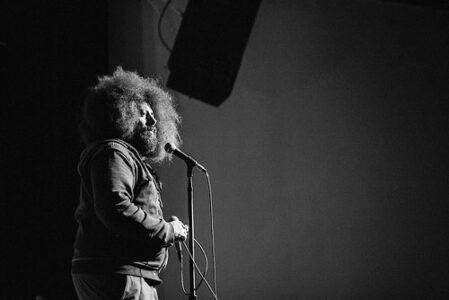Comedian Reggie Watts uses
disorienting performances to make his mark on the avant-garde branch of comedy
known as anti-comedy.
Like any other art form, comedy has its own version of the
avant-garde, and it’s a bizarre, but fascinating style of comedy where the
traditional formula of “set up / punchline / laughter / repeat” is twisted and
manipulated beyond recognition. Some have dubbed it anti-comedy for the simple
fact that the punchline—that traditional trigger for making people laugh—is
often absent from the joke, which can last an entire performance, and sometimes
even wear the disguise of a performance. As such, the confusion and discomfort
of the audience contributes to the joke, and the cues for laughter disappear.
What’s hilarious to one individual might be seriously baffling to another. Consider
it the funny form of Dada.
It’s hard to pinpoint who started anti-comedy, but the
pioneers of the form include Andy Kaufman, Steve Martin, and, as Martin Schneider
points out in
a recent post on off-beat culture blog Dangerous
Minds, Albert Brooks. These comics set the stage for a whole host of
contemporary, “alternative” comics to blow up the parameters of conventional
comedy and expand the possibilities of the art form.
One such comedian is Reggie Watts. Aside from his slightly
askew sense of humor, Watts’ weapon of choice
is an electronic looping pedal and an arsenal of vocal effects. Using only his
voice and an impressive amount of coordination, Watts
creates complex songs that impress as much as they amuse.
What really makes his act work, though, is the fact that
audiences have no idea where he’s going next. Watts
described his comedy in a recent
podcast with VICE as “a certain
form of disruption or discomfort, but it’s done [with] a benevolent feeling. It’s
about disrupting a certain thought process or the ways that we go about doing
things and kind of reframing or decontextualizing [them].”
I had the opportunity to catch Watts
open Conan O’Brien’s “Legally Prohibited From Being Funny on Television” tour a
few years ago, and I honestly didn’t know what I was watching at first. For a
while, I couldn’t tell if he was trying to be funny or if he was legitimately
trying to be a serious musical act. Others around me were equally confused as
to how we were supposed to react, and consequently, it made a lot of folks
uncomfortable; that is, until everyone stopped trying to figure him out and
just went with the flow. In other words, it was a stellar show, and Watts gained a lot of new fans that night.
Watts’ public profile is a
lot bigger now, and he’s currently juggling several projects; he’s the musical
sidekick to fellow comedian Scott Aukerman on the IFC sketch show “Comedy Bang! Bang!”, and
he’s also one of four comedic entities involved in a joint YouTube venture
called Jash along with
Sarah Silverman, Michael Cera, and the comic duo of Tim Heidecker and Eric
Wareheim. But if you’re not familiar with his work, perhaps the best
introduction to Watts’ style of anti-comedy is
his TED performance from last year in which he wows the crowd with his music while
poking fun at some TED speaker’s tendency to come across as too smart for their
own good:
Imagecourtesy of CleftClips, licensed under Creative Commons.
Christian Williams is Editor in Chief of Utne Reader, and he also paints and makes music.View and listen to his work at www.christianwwilliams.com. Follow him on Twitter: @cwwilliams.





